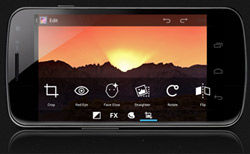 Google introduced custom search ads for mobile apps Wednesday. The ads, intended to provide "useful and relevant answers" for people searching in a mobile
app, also help application developers earn more money to fund their apps.
Google introduced custom search ads for mobile apps Wednesday. The ads, intended to provide "useful and relevant answers" for people searching in a mobile
app, also help application developers earn more money to fund their apps.
It's similar to the iTunes button you might find while listening to Pandora on mobile. The ad unit enables
businesses to use mobile search ads to direct someone to a page within a mobile app already installed on their phone. For example, if someone searches for sneakers on a mobile device, they might see
an ad that takes them directly into a shopping app installed on their phone.
The ad format serves up information that links searchers directly to the App Store or the Android Marketplace to
download when searching for information about an app. Google also enabled developers to include the app icons and information about the app in their ad unit.
advertisement
advertisement
Google also suggests, of course,
building local context into the ad unit, such as Click to Call and hyper-local search ads, as well as taking proximity into consideration for mobile search ad ranking. "The distance between a person
and an advertiser’s business location is now a factor in mobile search ads ranking," Surojit Chatterjee, senior product manager of mobile ads at Google, writes in a blog post. "This means an ad
for a business with a physical location close to a consumer may perform better in AdWords -- driving more mobile traffic at a lower cost."
Chatterjee explains that the feature becomes
effective only when consumers opt in to share their device location for mobile searches. It aims to make Google's hyper-local format more useful for businesses and users, he explains.
Research
firm eMarketer estimates advertisers will spend $1.2 billion globally this year -- up 66% sequentially, topping $4.4 billion by 2015.
Any foodies read Search Marketing Daily? Aside from
Google, Vertical Search Works (VSW), which builds semantic search widgets and advertising solutions, announced the launch of VS4Food, a semantic and voice search app for Android phone users.
Think of it as a mobile vertical search engine. Users enter a search query and generate results specific to food, products, recipes, restaurants and specialty retailers. Searches
are activated by voice, the phone's touchscreen or the keyboard.
VSW President and CEO Colin Jeavons calls VS4Food "an app for search." He believes marketers will move more toward
vertical engines and widgets to support specific content. "If you want more reliable access to content then you use a vertical search engine," he said. "When looking for general information, you use
something like Google."
VSW indexes and organizes about 500,000 concepts and 2.5 million expressions into more than 80 content verticals. Following the launch of VS4Food, the company will
introduce the mobile VS4 app across all of its verticals, including entertainment, home and garden, weddings and family.